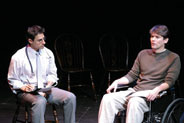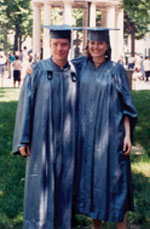|
|
 |
 |
 |
 |
|
FIRST PERSONBonum Serum BonumBy Lea Goldman ’98
In the four years we spent together, carousing one night, buried in the stacks the next, I never suspected that my friend James Kearney ’98 was a writer. He excelled academically, for sure, graduating with all the honors conferred upon Columbia’s brightest minds. With his wry, self-effacing humor and his Irish good looks, the sharpest blade in his arsenal was most certainly his intensity. But James, a writer? The same person who ran through Riverside Park at ungodly hours while the rest of us crept home from our Amsterdam haunts? Though he surrounded himself with jazz lovers, thinkers and artists of all kinds, it always seemed that James traveled with them, not among them. It’s funny how much you learn about a person the hard way. In August 2002, a day before his 25th birthday, James was diagnosed with an aggressive brain tumor. His doctors gave him two years, if that. But true to his personality, James waged a war of intensity. Over the course of 19 months, he underwent two craniotomies, countless chemotherapies and a round robin of treatments and pills that crowded the cupboards. He fortified his body any way he could: first by running, then by walking, even by doing bedside push-ups after his doctor told him to stop. He also fed his mind, poring over the works of thinkers such as Thomas Merton ’38, who helped him explain the inexplicable. James’ studies were a self-prescribed regimen that were as much a part of his daily treatment as his Taxol. James’ disease worsened. His tumor spread. And in June 2003, he moved to Europe, first Brussels, then Paris, for a grueling experimental treatment program. It seemed that this was his last hope. In fact, Paris was James’ great hope. It was there, in a new city teeming with inspiration, that James penned the play he had been aching to write. Kronos and Krainos is an unsettling glimpse into James’ mind as he wrestled with his mortality. The drama follows a group of overachieving but morally dissolute young urbanites on a desperate search for hope and purpose. Their lives become intertwined in New York City’s first suicide subway bombing. The play gives voice to James’ fears, regrets, and perhaps most importantly, his renewed faith in God. With poignancy and wit, it outlines our responsibilities as survivors: Bonum serum bonum, live the good life. “Sometimes God does his best work, plays his most rippin’ sets, in the dark,” James wrote. James returned from Paris with little hope for recovery. Bedridden by January, a dozen of his close friends convened at his family’s home in Westchester that month to perform Kronos and Krainos. Laughter echoed throughout the Kearney house, and for a few fleeting hours, it felt like the old days at Columbia.
James died on March 27, 2004, after a ferocious and courageous battle with cancer. He did not go gently. Having left us with a mission to live the good life, his twin sister, Megan ’98, explained that we all had a responsibility to his legacy. “James made me promise before he died that his death would not be in vain,” she said. Her goal was to stage Kronos and Krainos Off-Broadway by summer’s end: secure a seasoned director, hire an experienced cast and fill the aisles so that Kronos and Krainos, this gospel of James, might breathe life into his legacy. None of us had contacts in Manhattan’s theater circles. But we exploited, even harassed, our friends, many former Columbia classmates who now populate desks at the city’s premier newspapers, magazines and TV networks. Eventually, we connected with Victor Talmadge, a seasoned Los Angeles-based director who immediately grasped James’ vision. “The theme of faith, the constant discovery of one’s spirituality in the face of adverse circumstances, is also an idea that is wonderfully examined and universal in its message,” he wrote after reading the script. The producers, including Megan, David Miele ’98, TC ’04, Claudia DeSimio ’99, Joe Master ’98 and myself, scoured the theater district for a suitable (and affordable) stage before settling on The Peter Norton Space on West 42nd Street — intimate enough to complement the nature of the show yet large enough to accommodate the anticipated demand. (Overachievers, of course.) We sweated out July, hurriedly preparing press kits, websites, publicity plans, set designs and Playbills. Feverishly, we spread the word of Kronos and Krainos, distributing all tickets (free, courtesy of James’ family) within two weeks and building a wait-list that exploded within days of an am New York feature. Professional actors rehearsed for six hours a day in an empty Chinatown loft provided by Andy Topkins ’98 and his brother, David Topkins ’94. The weekend of July 23–25, Kronos and Krainos was performed before standing room audiences. James had breathed himself so completely into his characters that, if I shut my eyes, the actors’ voices echoed in the theater as James’. I’m certain I’m not the only one who experienced shivers that night. There were many occasions before — and will surely be occasions after — when we raise glasses and wipe away tears in remembering the beloved son, brother and friend we had in James Kearney. But on that weekend, to raucous applause and standing ovations, we also lauded James Kearney, the writer. Lea Goldman ’98 is a writer in New York City.
|
|
||||||||||||||||||||||||||||||||||||||||||||||||||||||||||||||||

